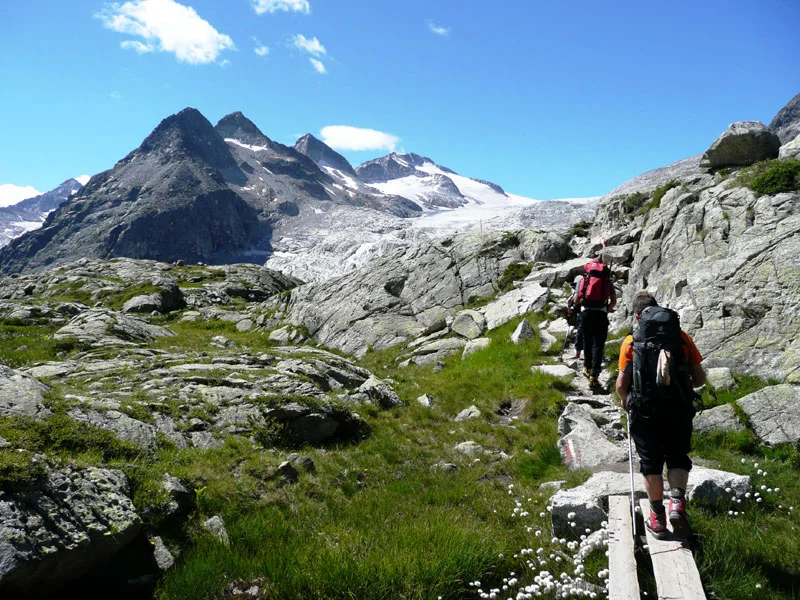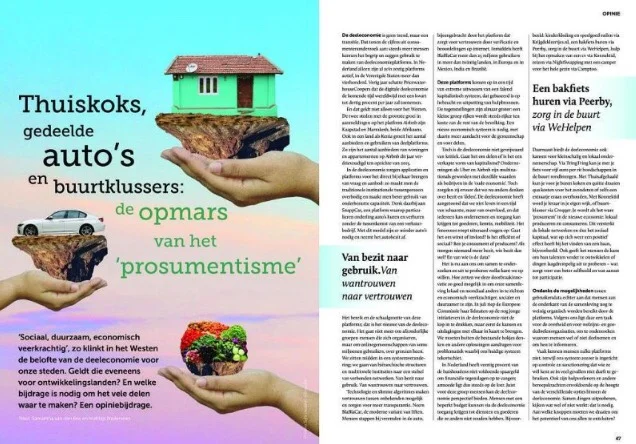Honeycombhousing is a social/cultural-housing platform to connect international students with homeowners on peer-to-peer basis in Sweden. Sanne Toonen (founder of Honeycombhousing) explained: 'It’s the social aspect that makes the difference. It’s best described as 'Fika'. The Swedish expression for coffee breaks that’s more about socializing than drinking coffee. This Swedish tradition shaped Honeycombhousing to what it is today and sets them apart from other services in providing housing for international students.'
Read MoreThroughout the past several years, we began to share more personal belongings online; it started with music, stories and pictures on social media. Additionally, we started to exchange more and more items through sites such as Marktplaats. The emergence of the sharing economy affects a growing number of economic sectors today; we share our houses on Airbnb, tools on Peerby, energy on Vandebron or Powerpeers, knowledge on Konnektid, food on Thuisafgehaald, rides on Blablacar, and cars and parking spaces on platforms such as Snappcar, MyWheels and Mobypark. With these platforms, the Dutch gain access to each other’s belongings and services. In the Netherlands, one in five people use online sharing platforms (including Airbnb and Marktplaats.nl). However, sharing is not a new phenomenon, as people used to share their belongings long before the emergence of the sharing economy. Nowadays, we do not merely share our belongings with friends, family or other relatives but also with people we have never met. Research has shown that the percentage of Dutch people who are willing to share their belongings with strangers has grown from 10% to over 30% in the last 3 years. Read more...
Read MoreIn this month's insights, you can read about:
- The launch of shareBE.
- Sharing Economy and Sustainable Tourism.
- The European Mobility Week kick off.
- Why people actually participate in the collaborative economy.
- The Green Deal day.
- Regulatory framework for the sharing economy.
- The Amsterdam Sharing City International Press trip.
And much more...
Read MoreAbout 150 people from all European countries are slowly trickling in around a big table, richly filled with colorful lunch options. Some have driven hours at night to catch a plane from their capital; others were a short train ride or even bike ride away. The diversity and mix of languages and cultures immediately creates a good vibe and lots of energy in the room.
Read MoreSustainability is often a reason for cities to consider becoming a sharing city. But what about sharing regions? During a morning in Trento I engaged with Trentino’s (Italy) tourism industry to explore the opportunities the collaborative (& sharing) economy for sustainable tourism in the region. Here are my main take-aways.
Read MoreThis edition of the shareNL insights tells you about the blockchain and the collaborative economy; the future of work and time; why tourists choose Airbnb; the sharing economy in disadvantaged communities; collaborative platforms and the labour force; what our youngsters can share'; sharing in Antwerp's creative & cultural sector; and much more...
- And check out where we will be in the next few days - busy month of March!
This meetup was a deep-dive into the future of the (collaborative) economy, and the future of society. While shareNL has been involved in the sharing/collaborative economy for quite some time now, the blockchain was a relatively new topic. With the aim of reshaping society, it was time to address the potential role of blockchain platform services in the current society. To answer the question of whether the blockchain will live up to its promise to enable a true peer-to-peer network, Pieter van den Glind (shareNL), Samantha van der Bos (shareNL), Perry Smit (Innovationlab of the Chamber of Commerce), Chris Huls (Rabobank), Jeroen Rijnbout (BITONIC), and Robert-Reinder Nederhoed (blandlord.com) provided us with insights into the possibilities of blockchain technology.
Read More“All the modern technologies have only let us work more, and work harder.” This is a popular statement these days, but they do not fit well with the actual numbers. Tools and machines have made us faster and stronger. Digital technologies have made us smarter and have let us communicate faster. Over time, technologies have dramatically increased our productivity. Today, we get more done in less time. Our output has increased both at the workplace and in the household.
Read MoreSharing the Sharing City experience newsletter including: the potential of car sharing; a car sharing solution for small countryside villages; the real (e)state of the sharing economy; what is needed to become a true sharing society; the 'peer-to-business-to-peer' marketplace; and much more...
Read More‘Social, sustainable and economically resilient’, that’s the promise of the sharing economy for our cities in the West. Is this also the case in developing countries? And what is needed to become a true sharing society? An opinion column.
Read MoreThe real (e)state of the sharing economy.
Why do streets look the way the look? Why buildings are designed they way they do? And how are cities shaped? Everything evolves around space. Space needed to live, work, meet, relax ánd to move around. That space to move has been increasing rapidly since the introduction of the automobile. Roads and parking places do not only use a large part of public space as well as private space and budget. Quite an inefficiently organised mobility system. Read more about the trend in re:shaping mobility in the early design and building phases of a city.
With non-profit organizations rethinking their strategies, local development programs and their own role in a changing world, Matthijs Nederveen and Samantha van den Bos believe the sharing economy is a topic, or a tool worth exploring. That's what we did on the 2nd of February. We came together and explored the current state, the development, opportunities and challenges of the collaborative economy in the global south at our shareNL home, in collaboration with The Spindle. And we did more than talking. Some good ideas were presented, and will be further developed. Read the full report by Elena Presas Batlló. (thank you!)
Read MoreThis weekend was a legendary one, for me personally, and I think for the other 399 and more people in the Big Building in Groningen too. It was the World’s biggest blockchain hackathon, and the first hackathon I witnessed. More than 50 multidisciplinary teams and 100 coaches - Jedi’s - got together to build a new operational system for our society. Read the full experience here.
By Samantha van den Bos
Read MoreSince I moved to the Netherlands, I’ve come across two very common reactions (among many other of course): 1. “You’re cold? But, you’re from Sweden!? How can you be cold?” – This reaction is not exclusive for the Netherlands, but quite international. I find it amusing, since we don’t, after all, although we do come from Sweden, grow fur.
The second reaction is that there’s a common agreement of how far Sweden has come with matters like the social system, innovation, sustainability, labor conditions etc.
Read more...
Door Pieter van de Glind, Edward Zevenbergen en Sander Klaver*
De afgelopen jaren zijn we steeds meer zaken online gaan delen; het begon met muziek, verhalen en foto’s via sociale media. Daarnaast zijn we meer en meer spullen van elkaar gaan kopen via sites als marktplaats. En vandaag dringt de snel opkomende ‘deeleconomie’ in steeds meer sectoren door: we delen onze woning via Airbnb, spullen via Peerby, energie via Vandebron of Powerpeers, kennis via Konnektid, eten via Thuisafgehaald, ritten via Blablacar en auto’s en parkeerplaatsen via platformen als Snappcar, MyWheels en Mobypark. Zo krijgen steeds meer Nederlanders toegang tot elkaars spullen en diensten. Eén op de vijf Nederlanders maakt gebruik van online deelplatformen (inclusief Airbnb en Marktplaats.nl). Voor de opkomst van de online deeleconomie deelden mensen vrijwel uitsluitend eigendommen met vrienden, familie en kennissen. Uit onderzoek komt naar voren dat het percentage Nederlanders dat er geen probleem mee heeft spullen met vreemden te delen in de afgelopen 3 jaar is gestegen van 10% naar ruim 30% . Lees meer...
Read MoreWith a world around us transforming by the second, it is very unlikely we are able to predict the future our children will grow up in. To prepare for this uncertain reality, children should be handed not only the right tools and skills to be able to manoeuvre their way through - such as the use of tablets, 3D printing, coding, design thinking - , but they should also be equipped with the right 21st Century mindset. Read more...
Read MoreCities battle many challenges, and recourses are often scarce to address these. Born out of issues that cities face and combining it with the collaborative economy, is what we like to call the Sharing City. Why should your city start using sharing to your advantage and work towards becoming a sharing city?
Read MoreA brand new newsletter to wish you all the best for 2017, and to provide you with the latest insights!
Read More‘Sociaal, duurzaam, economisch veerkrachtig’, zo klinkt in het Westen de belofte van de deeleconomie voor onze steden. Geldt die eveneens voor ontwikkelingslanden? En welke bijdrage is nodig om het vele delen waar te maken? Een opiniebijdrage door Samantha van den Bos en Matthijs Nederveen, oorspronkelijk gepubliceerd in Vice Versa (22 december 2016).
Read MoreStel, je hebt een prachtig idee voor een platform. Hoe breng je je startup van de grond? Lynda Provoost vertelt hoe startup MotoShare het ervaart om via een deelplatform haar financiering rond te krijgen: zij kozen ervoor om crowdfunding in te schakelen. Momenteel zitten ze in de laatste fase. Lees meer...
Read More




















